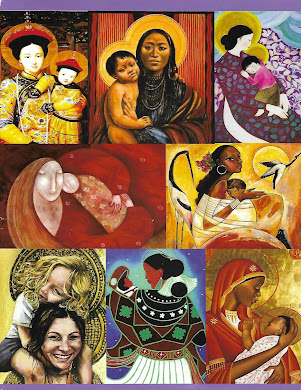Dear Friends,
Are you old enough to remember holy cards? Pictures of
Jesus, Mary, Joseph or the saints? I had a whole collection of Mary images. She
was sometimes alone, sometimes holding Jesus. These cards exclusively portrayed
Mary as white, pink-cheeked, young, clothed in simple blue or white.
At the head of this blog is a series of images of Mary
created by artists* from various parts of the world. Mary looks like the people
of their country. Her clothes and facial expressions are theirs. These images
say that Mary belongs to them, not as a foreign import, but someone God has given
them to be the Mother of God as they envision her, their own Mother, their
morning star, teacher, companion and friend. As with Jesus, Mary is not a stranger
to people of any land as they grow in faith.
This month, October, in the universal church, is dedicated
to Mary, and, to the Rosary which is one way we pray to her. The Rosary is
credited to Dominic in the 13th century, who taught it to people who
were largely illiterate. They couldn’t read the Scriptures, but they could memorize
the joys, sorrows, and glorious times of Jesus’ life. Saying the “Hail Mary” on
each of 10 beads, they could blend the scriptural truths of Jesus with Mary’s
own life. Jesus would not have come if Mary had not said “YES.”
Pope St. John Paul II added a new set of meditations to the Rosary.
Entitled the luminous mysteries, they fill in the gap from Jesus’ infancy and
childhood to His arrival in Jerusalem, passion, and death. The luminous
mysteries include the Baptism of Jesus by John, the wedding feast at Cana, the
proclamation of the Kingdom, the Transfiguration, and the Giving of the
Eucharist at the Last Supper. Popes since the 16th century have encouraged
believers to say the Rosary. With beautiful transparency, recent popes have
reflected on the power of the Rosary in their lives:
“With the Rosary, we allow ourselves to be guided by Mary,
model of faith, in meditating on the mysteries of Christ, and day after day, we
are helped to assimilate the Gospel, so that it shapes our lives.” (Benedict
XVI)
“The Rosary is our daily meeting that neither I nor the Blessed
Virgin Mary neglect.” (Pope St. John Paul II)
“The Rosary is a School of Prayer and a School of Faith.”
(Pope Francis)
The unity of all aspects of the mystery of God in Christ is
present as fingers, heart and mind focus on the living Christ. Some people
carry a chaplet (one decade in a small circular configuration) in their pockets
to pray during a walk from one place to another. Some people simply finger the
beads without words.
Many contemporary Catholics have given up the Rosary as a form of prayer as archaic or too repetitive. It takes practice to reclaim this way of prayer, especially now in a time when meditation and contemplation tug at our prayer-heart-strings. In the Rosary, the words of the Hail Mary slip in and out of the mystery being contemplated. After a while, it works.
~Sister Joan Sobala
*Photo above: Top (L-R): Mother and God: Queen of China (Chu
Kar Kai); North American Indigenous Mother and Child (Fr. John Giuliani);
Vietnam Mother and Child (unknown)
Middle (L-R): Italian Madonna (Allesandra Cimatrous);
Sunshine Mother and Child (Shijun Munns)
Bottom (L-R): Modern Day Mother and Child (Jessica Russo Scheer); Navajo Mother and Child (Katherine Schange); Black Mother and Child (Unknown) Found in Corpus Reports






